1. Early life and education
Malcolm Bligh Turnbull was born in Sydney, New South Wales, on 24 October 1954. He was the only child of Bruce Bligh Turnbull, a hotel broker, and Coral Magnolia Lansbury, a radio actor, writer, and academic. His maternal grandmother, May Lansbury (née Morle), was born in England, while his other grandparents were Australian-born. Turnbull also has Scottish ancestry, with his great-great-great-grandfather, John Turnbull, arriving in New South Wales in 1802. The middle name "Bligh" is a family tradition, given in honor of Governor William Bligh.
His parents married in December 1955, fourteen months after his birth. The family initially lived in a two-bedroom flat in Vaucluse, where Turnbull attended the local public school. His parents' marriage was unhappy, and Turnbull later wrote that they rarely slept or spent time together, staying married only for his sake. His mother often belittled his father for his lack of education, asserting that the family's fortunes depended on her. When Turnbull was nine, his mother left with John Salmon, a history professor, to New Zealand, effectively ending the marriage. His father told him she was studying for another degree, though she had left him. From then on, Turnbull was raised solely by his father. He suffered from asthma as a young child.
After three years at Vaucluse Public School, Turnbull began boarding at Sydney Grammar School in St Ives. He disliked boarding school, experiencing bullying due to bedwetting. His father, now a single parent, struggled with school fees, leading to frequent letters from the school bursar. These financial difficulties forced them to move to a small, sparsely furnished flat in Double Bay. Turnbull later attended Grammar's high school campus on College Street on a partial scholarship, living at the school's former Randwick boarding facilities. As his father remarried and his business prospered, the financial strain eased, and they moved to a large apartment in Point Piper.
Despite being a mediocre mathematician, Turnbull excelled in Greek, English, and History. He joined the debating and drama clubs, winning the Lawrence Campbell Oratory Competition and starring in several Shakespeare plays. He was made senior school co-captain in 1972, though he was not the dux of his graduating year. In 1987, in memory of his father, he established the Bruce Turnbull means-tested scholarship at Sydney Grammar, providing full fee remission to students in need.
In 1973, Turnbull enrolled at the University of Sydney, earning a Bachelor of Arts in political science in 1977 and a Bachelor of Laws in 1978. During this time, he wrote largely about politics for the university newspaper, Honi Soit, and visited former Premier of New South Wales Jack Lang to discuss state politics of the 1920s and 1930s. He was active in student politics, serving as a board director of the University of Sydney Union and a member of the Students' Representative Council. He also worked part-time as a political journalist for Nation Review, Radio 2SM, and Channel 9, covering state politics. It was around this period that he met businessman Kerry Packer, for whom he would later undertake extensive legal work.
In 1978, Turnbull was awarded a Rhodes Scholarship, enabling him to attend Brasenose College, Oxford. He initially pursued a business degree before switching to a postgraduate Bachelor of Civil Law, which he completed with honors from 1978 to 1980. While at Oxford, he contributed to newspapers and magazines in the United States and Australia. He befriended Theresa May, who would later become UK Prime Minister, and she credited Turnbull with encouraging her husband, Philip May, to propose to her. He also met his future wife, Lucy Hughes, during his time at Oxford. A university don at Oxford noted of Turnbull that he was "always going to enter life's rooms without knocking."
2. Professional career
After graduating from Oxford, Turnbull returned to Australia and commenced his career as a barrister. From 1983 to 1985, he served as general counsel and secretary for Australian Consolidated Press Holdings Group. During this period, he notably defended Kerry Packer against the "Goanna" allegations made by the Costigan Commission, which accused Packer of the murder of bank manager Ian Coote and other crimes. Turnbull employed aggressive tactics, including intentionally defamatory statements published in newspapers, to influence public opinion in Packer's favor. He later advised Packer to sue the commission's counsel, Douglas Meagher QC, for defamation, an action that was struck down as an abuse of process by Justice David Hunt, who stated that Turnbull had "poisoned the fountain of justice." These tactics created animosity within the NSW Bar Association, leading to Turnbull's departure. Following the Costigan Commission's findings, which accused Packer of tax evasion, drug trafficking, and murder, Turnbull contacted Premier of Queensland Joh Bjelke-Petersen, who agreed to hold an inquest that ultimately refuted the murder allegations against Packer.
2.1. Spycatcher trial
In 1986, Turnbull established his own law firm, Turnbull McWilliam, in partnership with Bruce McWilliam. A significant case during this period was his defense of Peter Wright, a former MI5 official who authored the book Spycatcher, which detailed his work for the British spy agency during the Cold War. The British government sought an injunction to prevent the book's sale in Australia. Turnbull successfully argued that the book contained no new information, that other books with confidential details had been permitted by the British government with minimal changes, and that the government had misled the court throughout the trial. The case, which went through the New South Wales Court of Appeal, prevented the British government's attempts to suppress the book's publication in Australia. The widely reported victory made Turnbull a public figure in both Australia and the United Kingdom, contributing to the book's sale of over 2 million copies in Australia. Turnbull later authored a book about the trial, titled The Spycatcher Trial.
Turnbull's closing submissions on 18 December 1986, highlighted his belief in free speech: "The fact of the matter is that nothing is achieved in this world, particularly politically, other than with persistence, and persistence involves repetition and it involves argument and re-argument... The public interest in free speech is not just in truthful speech, in correct speech, in fair speech... The interest is in the debate. You see, every person who has ultimately changed the course of history has started off being unpopular."
2.2. Other legal and business work
In 1987, Turnbull co-founded an investment banking firm, Whitlam Turnbull & Co Ltd, with Neville Wran, the former Labor Premier of New South Wales, and Nicholas Whitlam, son of former Labor Prime Minister Gough Whitlam and former Chief Executive of the State Bank of New South Wales. Whitlam left the firm in 1990, and it continued as Turnbull & Partners Ltd until 1997.
In 1997, Turnbull departed the firm he co-founded to become a managing director at Goldman Sachs Australia, eventually rising to become a partner in Goldman Sachs and Co. He also served as a director of Star Technology Systems from 1993 to 1995. During this time, Turnbull was also the chairman of Axiom Forest Resources, which conducted logging operations in the Solomon Islands under the trading name Silvania Forest Products. The Australian International Development Assistance Bureau described these operations as "clear-felling", and the then-Solomon Islands Prime Minister Solomon Mamaloni reportedly threatened to shut down the company for "constant breaches of logging practices," according to a critical article in the Solomon Times.
In 1994, Turnbull acquired a stake in the internet service provider OzEmail for 500.00 K AUD. He sold this stake in 1999 for 57.00 M AUD to then-telecommunications giant MCI Worldcom, several months before the dot-com bubble burst.
In May 2002, Turnbull testified before the HIH Insurance royal commission, facing questions about Goldman Sachs's involvement in the potential privatisation of an acquisition by the collapsed insurance company. While the Royal Commissioner's report made no adverse findings against him or Goldman Sachs, Turnbull was among nine defendants who later settled litigation over the collapse through undisclosed payments, estimated to be as much as 500.00 M AUD.
3. Early political involvement
Turnbull's initial attempts to enter federal politics began in 1981 when he sought Liberal Party preselection for the Division of Wentworth ahead of the 1981 Wentworth by-election. He was unsuccessful, losing to Peter Coleman. In 1982, following his retirement from politics, former Prime Minister William McMahon nominated Turnbull as his preferred successor in Lowe; however, the Liberals chose another candidate, and subsequently lost the by-election to Labor. Turnbull made another attempt at preselection in 1983 for the safe state seat of Mosman, but was defeated by Phillip Smiles. He allowed his membership of the Liberal Party to lapse in 1986, before rejoining in 2000.
Upon rejoining the party, Turnbull was appointed Federal Treasurer of the Liberal Party in 2000 and served as a member of the party's federal and New South Wales executives from 2002 to 2003. He also spent time as a director of the Menzies Research Centre, the Liberal Party's research center.
3.1. Australian Republican Movement
In 1993, Prime Minister Paul Keating appointed Turnbull as Chair of the Republic Advisory Committee, tasked with exploring pathways for Australia to transition to a republican form of government by replacing the Queen of Australia with an elected Australian head of state. Later that year, Turnbull became Chair of the Australian Republican Movement, a position he held until 2000. He was an elected delegate at the 1998 Australian Constitutional Convention in Canberra. At the convention, Turnbull advocated for a parliamentary republic, cautioning against mixing the roles of president and prime minister, and supported the bi-partisan appointment republican model adopted by the convention.
Turnbull was a prominent and active campaigner for the "Yes" campaign in the unsuccessful 1999 referendum to establish an Australian republic, serving as Chair of the Yes Committee. He published a book on the campaign, titled Fighting for the Republic. Following the referendum's failure, he publicly accused incumbent Prime Minister and monarchist John Howard of "breaking the nation's heart." Turnbull retired from the Australian Republican Movement in 2000, having previously left the board of Ausflag in 1994; he later joined the Australian National Flag Association in 2004.
3.2. Choice of political party
Despite his long affiliation with the Liberal Party of Australia, Turnbull, during his time with the Australian Republican Movement, considered running for preselection for the Australian Labor Party. His mother was close friends with Premier of New South Wales Neville Wran and Senator Lionel Murphy, both members of the Labor Party. Turnbull himself was also friends with another Labor premier, Bob Carr. In 2015, it was revealed that Turnbull had held discussions with Labor state politician John Della Bosca in the 1990s about a potential party switch. He also harbored aspirations in his youth to lead the Australian Workers' Union, which is linked with the Labor Party. These accusations, made by former Labor Foreign Minister Bob Carr, were cited by Labor Leader Bill Shorten during the Royal Commission into Trade Union Governance and Corruption.
4. Entry into Parliament
In 2000, Turnbull initially intended to seek Liberal preselection for Wentworth but ultimately did not contest, concluding that fellow hopeful Peter King had sufficient support within the local branches. However, in 2003, Turnbull announced his challenge to King for the seat and successfully defeated him to become the Liberal candidate. The preselection campaign was contentious, with King accusing Turnbull of "branch stacking" by having local members transfer their memberships to branches that would decide the pre-selection, a practice King referred to as "branch stripping."
Following his preselection loss, Peter King stood against Turnbull in the 2004 federal election as an independent candidate. This turned the traditionally safe Liberal seat into an electoral wildcard, with the contest becoming a three-person race between Turnbull, King, and the Labor candidate David Patch. During the campaign, Turnbull spent over 600.00 K AUD on his campaign. While the Liberal primary vote ultimately fell by 10.3% to a total of 41.8%, King received only 18% of the primary vote. A 57%/43% Liberal/Labor preference split meant Turnbull was elected, albeit on a reduced 55.5% two-party vote after a 2.4% swing. This result classified Wentworth as a marginal seat for the first time since the 1993 federal election.
5. Howard government
On 24 January 2006, Prime Minister John Howard announced a cabinet reshuffle, promoting Turnbull from the backbench to the role of parliamentary secretary. In this capacity, he was given special responsibility for water at the height of the 2000s Australian drought. On 26 September 2006, Howard further announced the creation of a new Office of Water Resources within the Department of the Prime Minister and Cabinet to address Australia's drought issues, with Turnbull assigned responsibility for this office.
In January 2007, Howard promoted Turnbull to the Cabinet as Minister for the Environment and Water. In this role, Turnbull approved a proposed 1.70 B AUD Bell Bay Pulp Mill in northern Tasmania, near Launceston. His approval of the Gunns project on 4 October 2007 followed a report by the government's chief scientist Jim Peacock on the project's potential environmental impact, which stipulated that the project had to meet 48 "strict environmental" conditions.
In February 2007, Turnbull faced criticism for claiming a government allowance of 175 AUD per night and paying it to his wife as rent while residing in a townhouse she owned in Canberra.
During the 2007 federal election campaign, Turnbull announced that, if re-elected, the government would contribute 10.00 M AUD to investigate an untried Russian technology designed to trigger rainfall from the atmosphere, even in the absence of clouds. The Australian Rain Corporation presented research documents written in Russian, explained by a Russian researcher who communicated with local experts in Russian. Despite Turnbull's claim that the Australian Rain Corporation was Australian-based, investigations revealed it was 75% Swiss-owned. It was also disclosed that a prominent stakeholder in the company, Matt Handbury, was a nephew of Rupert Murdoch. Turnbull declined to answer questions regarding Handbury's financial contributions to the Wentworth Forum, his main fundraising organization for the 2007 election campaign.
6. Opposition
6.1. Aftermath of 2007 election
Turnbull successfully retained his seat in the 2007 Australian federal election with a 1.3% two-party vote swing in Wentworth, despite a 5.6% swing away from the Coalition in New South Wales and a 5.4% swing against them nationwide. Following John Howard's loss of his seat of Bennelong on 25 November 2007, Peter Costello, whom Howard publicly endorsed as his successor, announced he would not seek the party leadership. Turnbull declared his candidacy later that day and was widely considered a favorite by the media.
On 29 November, he narrowly lost the leadership vote to Brendan Nelson by three votes. Nelson quickly appointed Turnbull Shadow Treasurer. Shortly after the vote, fellow Shadow Cabinet Minister Nick Minchin publicly suggested that Turnbull's failure to consult with party colleagues before expressing his opinions to the media on issues such as an apology to the Stolen Generations had cost him the leadership. This led to a disagreement between the two, culminating in Minchin privately telling Turnbull that he was "too fucking sensitive." In May 2008, Turnbull led the Coalition's response to the 2008 Australian federal budget, criticizing increased taxes on luxury cars and certain alcoholic drinks, citing a possible increase in inflation as a concern.
6.2. Leader of the Opposition (2008-2009)
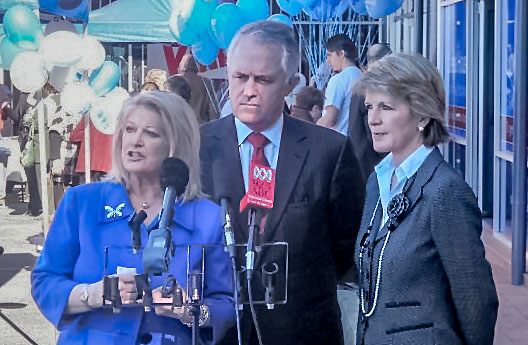
After months of consistently poor opinion polling for the Liberal Party, Turnbull challenged Brendan Nelson for the leadership on 16 September 2008. He won the ballot by four votes (45 to 41) and became Leader of the Opposition. Later that month, Turnbull publicly confessed to having smoked marijuana in his younger days, becoming the first Liberal Leader to make such an admission. In early 2009, Turnbull appointed Chris Kenny, a former staffer to Alexander Downer and an Advertiser journalist, as his chief of staff. In May 2009, Turnbull criticized the 2009 Australian federal budget, which was delivered amidst the fallout from the global financial crisis.
In June 2009, Godwin Grech, a Treasury civil servant, privately contacted Turnbull, alleging that a car dealer with links to the Labor Party had received preferential treatment under the OzCar program, sparking the 'OzCar affair'. Turnbull later repeated these allegations in Parliament, stating that Prime Minister Kevin Rudd and Treasurer Wayne Swan had "used their offices and taxpayers' resources to seek advantage for one of their mates and then lied about it to the Parliament" and that they needed to "either explain their actions or resign." On 22 June, the email Grech had secretly provided to Turnbull supporting the allegation was alleged to have been faked by Grech. Grech subsequently admitted the forgery, with an Australian National Audit Office inquiry on 4 August clearing both Rudd and Swan of any wrongdoing. The resulting embarrassment of having repeated false allegations, as well as Turnbull's demeanor throughout the OzCar affair, was widely seen as the cause of a significant decline in his approval ratings in opinion polls.
On 24 November 2009, Liberal and National MPs and Senators met to discuss the Rudd government's proposed Carbon Pollution Reduction Scheme (CPRS). Turnbull announced that his policy would be to support the CPRS, despite significant disagreement among his colleagues. In response, Liberal MPs Wilson Tuckey and Dennis Jensen sought to move a leadership spill motion, intending to nominate Kevin Andrews as a challenger to Turnbull. While this attempt failed, increasing numbers of MPs and Senators publicly criticized the position, with several resigning from the Shadow Cabinet, including Tony Abbott.
On 1 December 2009, just one week after Turnbull announced his position on the CPRS, Abbott announced he would challenge Turnbull for the leadership. Though initially regarded as having little chance of success, with Turnbull publicly stating that Abbott did not have the numbers to win, Abbott defeated Turnbull in the ballot by a single vote (42 to 41). After the shock result, Turnbull returned to the backbench and stated he would serve out the remainder of his term as Member for Wentworth. On 6 April 2010, he announced he would not seek re-election to the Australian Parliament. However, on 1 May 2010, he reversed this decision, stating he had been convinced by former Prime Minister John Howard not to abandon his political career.
6.3. Shadow Minister (2010-2013)
At the 2010 federal election, Turnbull was re-elected with an 11.01% two-party swing in his favor. After discussions with Tony Abbott regarding a return to the Shadow Cabinet, Turnbull was appointed Shadow Minister for Communications. In his first policy announcement in this role, Turnbull stated that a Coalition government would "demolish" the recently introduced National Broadband Network (NBN).
Delivering the 2012 Alfred Deakin Lecture on digital liberty, he spoke out strongly against the Gillard government's proposed two-year data retention law. In July 2012, Turnbull was criticized by some Liberal MPs for suggesting that civil unions should be introduced as a first step towards establishing same-sex marriage in Australia. Tony Abbott rejected Turnbull's suggestion of holding a conscience vote on the issue.
7. Abbott government
7.1. Minister for Communications (2013-2015)
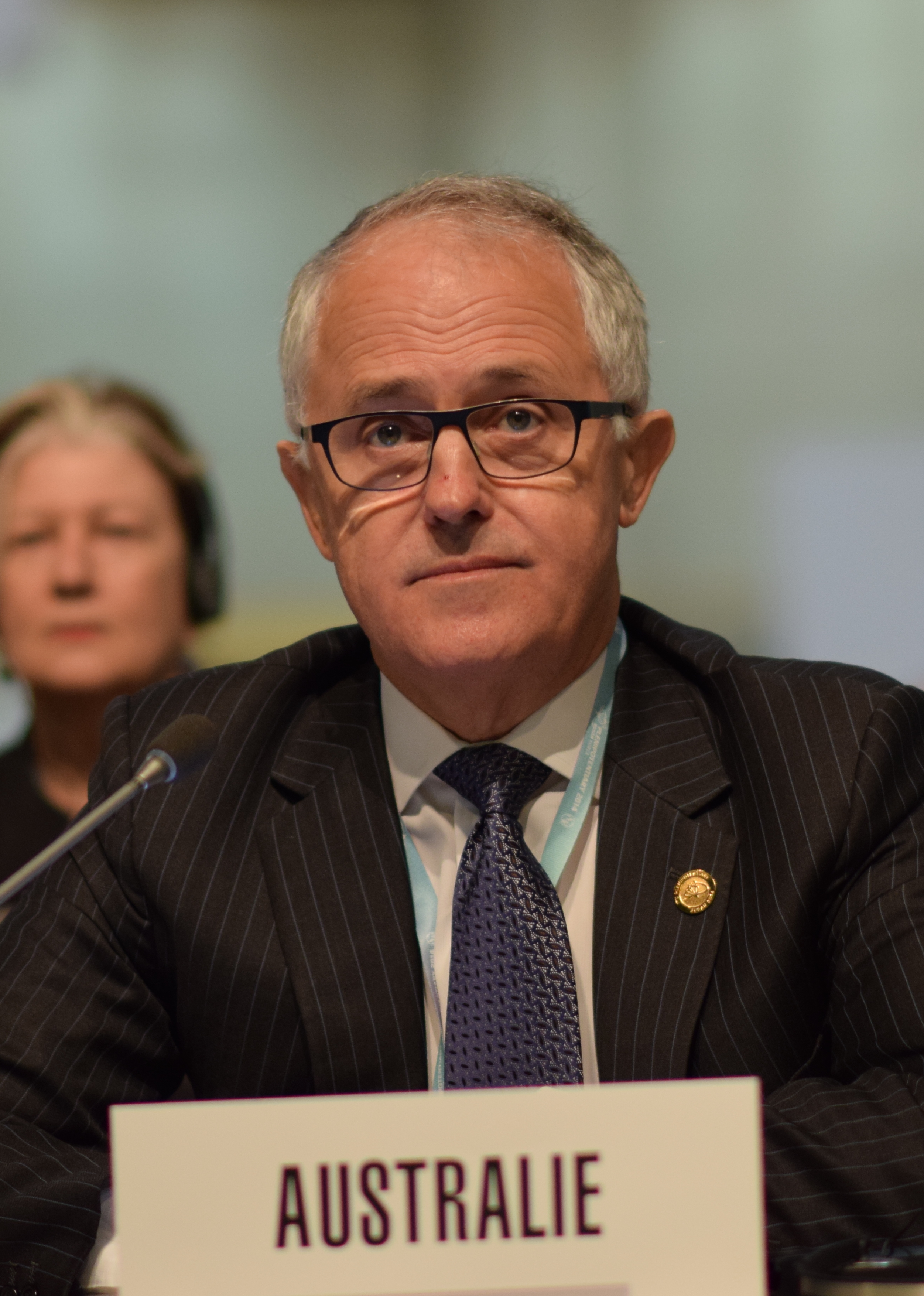
On 9 April 2013, Turnbull and Tony Abbott presented the Liberal Party's alternative National Broadband Network (NBN) plan. This revised plan prioritized a modified and scaled-down NBN using "fibre to the node" (FTTN) and last-mile connections via copper cable. This new policy contrasted with the Coalition's previous position, which had called for the dismantling of the entire NBN.
Following the Coalition's victory in the 2013 federal election, Turnbull was appointed Minister for Communications and began implementing the alternative NBN strategy. In 2014, Turnbull announced that the Vertigan Report, a cost-benefit analysis of providing fast broadband to regional and rural Australia through wireless and satellite services, revealed that continuing the plan would cost nearly 5.00 B AUD and was expected to yield only 600.00 M AUD in economic benefits-a return of just 10%. Despite the significant economic cost, Turnbull stated that while subsidizing broadband to regional areas is "fiendishly expensive," there was no other viable option.
In December 2014, Turnbull brokered a deal between the Australian government, NBN Co, and Telstra whereby NBN Co acquired Telstra's copper network and hybrid-fibre coaxial (HFC) to deliver the NBN. Telstra and NBN Co agreed to collaborate on an FTTN trial involving 200,000 premises. In August 2015, Turnbull revealed that the overall final cost of the network build would likely expand by an additional up to 15.00 B AUD, with NBN Co expected to incur this additional expenditure as debt. Although still projected to be cheaper than the original Labor Party NBN policy, which aimed for much faster connection speeds, the peak funding requirement under the Liberal model ranged between 46.00 B AUD and 56.00 B AUD.
7.2. February 2015 leadership spill motion
Following persistent leadership tensions amidst consistently poor opinion polling for the Abbott government, a leadership spill motion was moved against Tony Abbott on 9 February 2015. Although the spill motion was defeated by 61 votes to 39, Turnbull had been reported as considering a run for the leadership if the spill motion had succeeded. Before the motion, Turnbull told reporters that "if, for whatever reason, the leadership of a political party is vacant then anyone, any member of the party can stand, whether they be a minister or a backbencher, without any disloyalty to the person whose leadership has been declared vacant."
8. Prime Minister of Australia (2015-2018)
Malcolm Turnbull's premiership, from 2015 to 2018, was characterized by efforts to modernize Australia's economy, address social issues, and navigate complex international relations, all while facing significant internal party divisions.
8.1. September 2015 leadership election
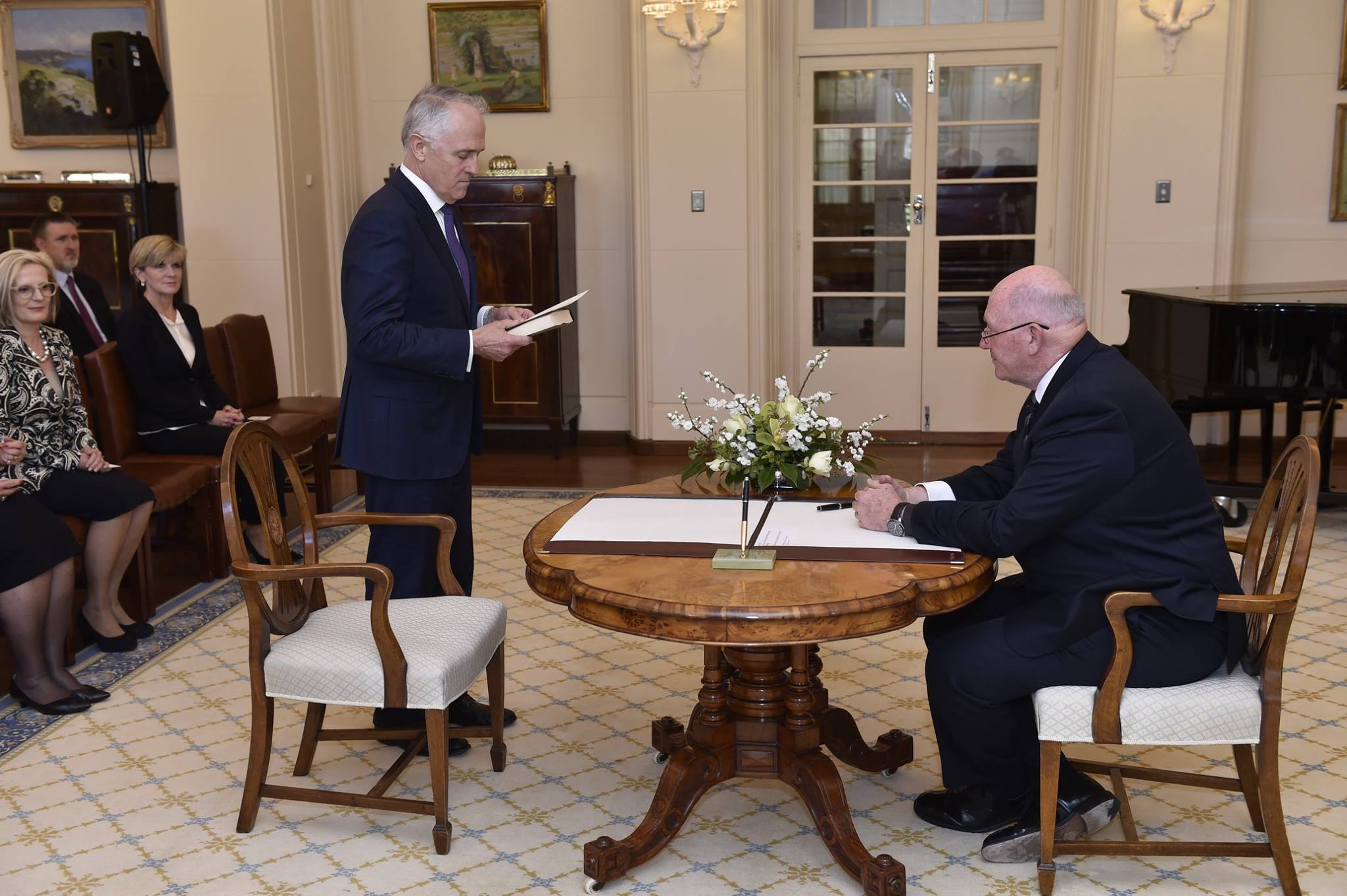
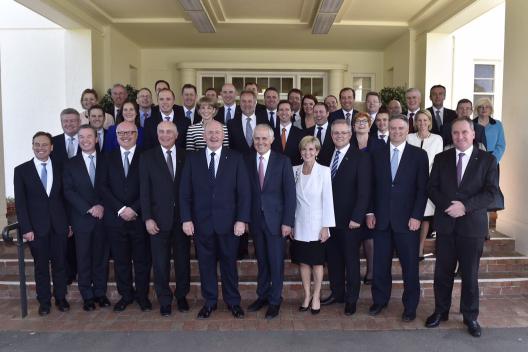
Despite the defeat of the February 2015 spill motion, questions over Abbott's leadership persisted, with the government consistently performing poorly in opinion polls. On 14 September 2015, after 30 consecutive Newspolls showed the Liberals significantly trailing Labor, Turnbull resigned from the Cabinet and announced he would challenge Abbott for the leadership of the Liberal Party. Turnbull stated that Abbott "was not capable of providing the economic leadership we need" and that the Liberal Party needed a "style of leadership that respects the people's intelligence." Turnbull defeated Abbott by 54 votes to 44 at the subsequent leadership ballot. He was sworn in as the 29th Prime Minister of Australia the following day, 15 September.
Turnbull announced an extensive reshuffle of the Cabinet on 20 September 2015 to form the First Turnbull Ministry. Notably, he increased the number of female Cabinet ministers from two to five and appointed Marise Payne as Australia's first female Minister for Defence. The total number of Cabinet ministers rose from 19 to 21. Regarding his key policy differences with Abbott, particularly on climate change, republicanism, and same-sex marriage, Turnbull stated that there would be no immediate change before any election. The Nationals successfully negotiated deals totaling 4.00 B AUD from Turnbull, along with control of the water portfolio, in exchange for a continued Coalition agreement. Turnbull affirmed that he would not lead a government that did not take climate change seriously.
8.2. 2016 federal election
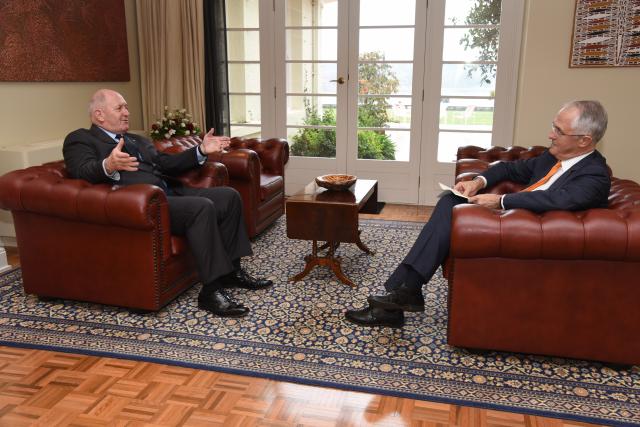
On 21 March 2016, Turnbull announced that Parliament would consider bills to reinstate the Australian Building and Construction Commission (ABCC), after these bills had been rejected twice before. Turnbull stated that if the Senate rejected the bills a third time, he would advise the governor-general, Sir Peter Cosgrove, to call a double dissolution of Parliament and a federal election for 2 July. Turnbull also brought forward the delivery of the federal budget from 10 May to 3 May to facilitate this. On 18 April, the Senate once again rejected the ABCC bills. On 8 May, Turnbull visited Government House to advise Cosgrove to issue the writs for a double dissolution on 9 May, confirming the election date as 2 July 2016.
During the 2016 Australian federal election campaign, a ReachTEL opinion poll of 626 Wentworth voters conducted on 31 May predicted a 10.9% two-party swing against Turnbull, the first since his election to Wentworth, resulting in a reduced 58% two-party vote. A controversy arose when the president of the Australian National Imams Council, Sheikh Shady Alsuleiman, participated in an Iftar dinner hosted by Turnbull at Kirribilli House. Turnbull later stated he would not have invited Alsuleiman if he had known of his positions regarding homosexuals.
At the election, the Coalition lost 14 seats and retained majority government by a single seat. The result was the closest since the 1961 Australian federal election. In the days following the election, when the outcome was still uncertain, Turnbull had to negotiate with the crossbench to secure confidence and supply support from Bob Katter, Andrew Wilkie, and Cathy McGowan in the event of a hung parliament and a resulting minority government. In February 2017, Turnbull confirmed he had personally donated 1.75 M AUD to the Liberal Party's election campaign.
8.3. Key policies and achievements
8.3.1. Asylum seeker policy
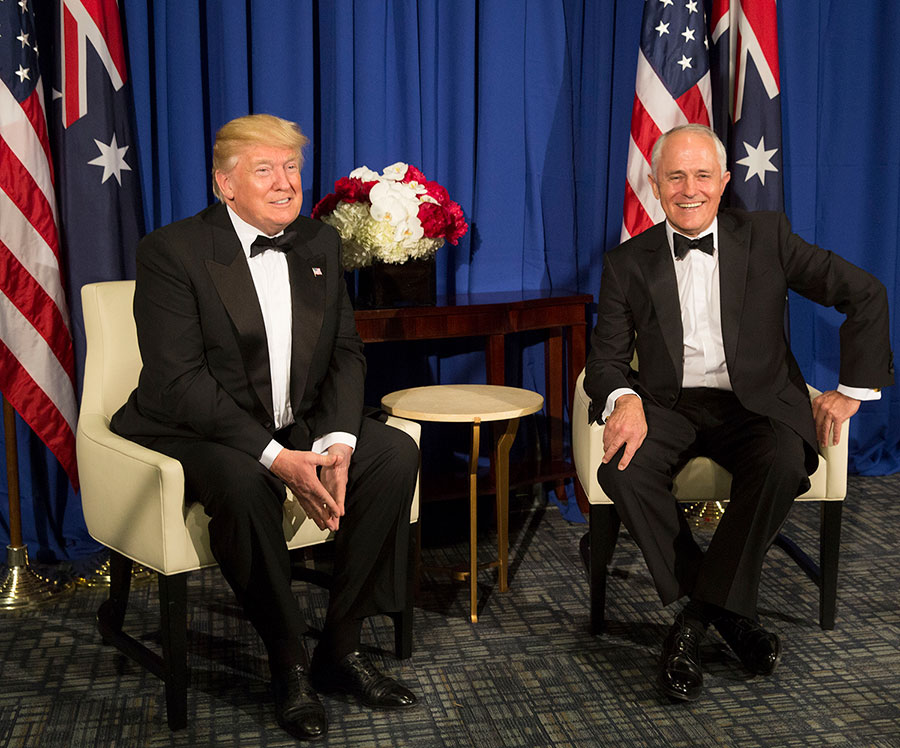
Asylum seeker policy is a contentious wedge issue in Australian politics, especially since the Tampa affair. The Coalition's asylum seeker policy under Turnbull continued the bipartisan stance of Operation Sovereign Borders. Around 1,250 asylum seekers remained in offshore processing centers on Manus Island and Nauru. In August 2016, protestors called for the closure of camps on Manus and Nauru after The Guardian released leaked incident reports alleging "routine dysfunction and cruelty" on Nauru.
In July 2016, the Obama administration established a refugee center in Costa Rica in response to a Central American migration crisis. In November, Turnbull and Peter Dutton announced that Australia would accept 1,250 refugees from Central America, in exchange for the U.S. accepting refugees from Nauru and Manus. This deal was criticized by Donald Trump, who, on 2 February 2017, tweeted that Obama's deal was "dumb." The transcript of a phone conversation between Turnbull and Trump on 28 January 2017, later leaked to The Washington Post, revealed a contentious exchange over the agreement. US Vice President Mike Pence later confirmed that the United States would honor the deal, subject to "extreme vetting" of asylum seekers. Australia began receiving Central American asylum seekers in July 2017.
8.3.2. Energy policy
Since the 2016 election, the Turnbull government generally followed prior Coalition government energy policies, which involved the dismissal of renewable energy targets and emissions intensity schemes. This stance hardened after South Australia experienced large blackouts, which Turnbull attributed to the state's "ambitious" renewable energy target. In response to the gas and energy crisis that occurred in March 2017, Malcolm Turnbull announced a 50% increase in the capacity of Snowy Hydro through "pumped hydro" technology, known as Snowy Hydro 2.0.
In April 2017, Turnbull announced that he would use the Commonwealth government's powers to place export restrictions on the nation's liquefied natural gas ("LNG") industry. He stated these changes were in response to high wholesale gas prices caused by a shortage in the domestic gas market, deeming it "unacceptable" that domestic prices were so high. He indicated that a consequence of these restrictions would be a decrease in the wholesale gas price. The multinational gas companies and the gas industry association heavily criticized the policy, arguing it would neither increase supply nor reduce the wholesale price of gas.
8.3.3. Same-sex marriage plebiscite
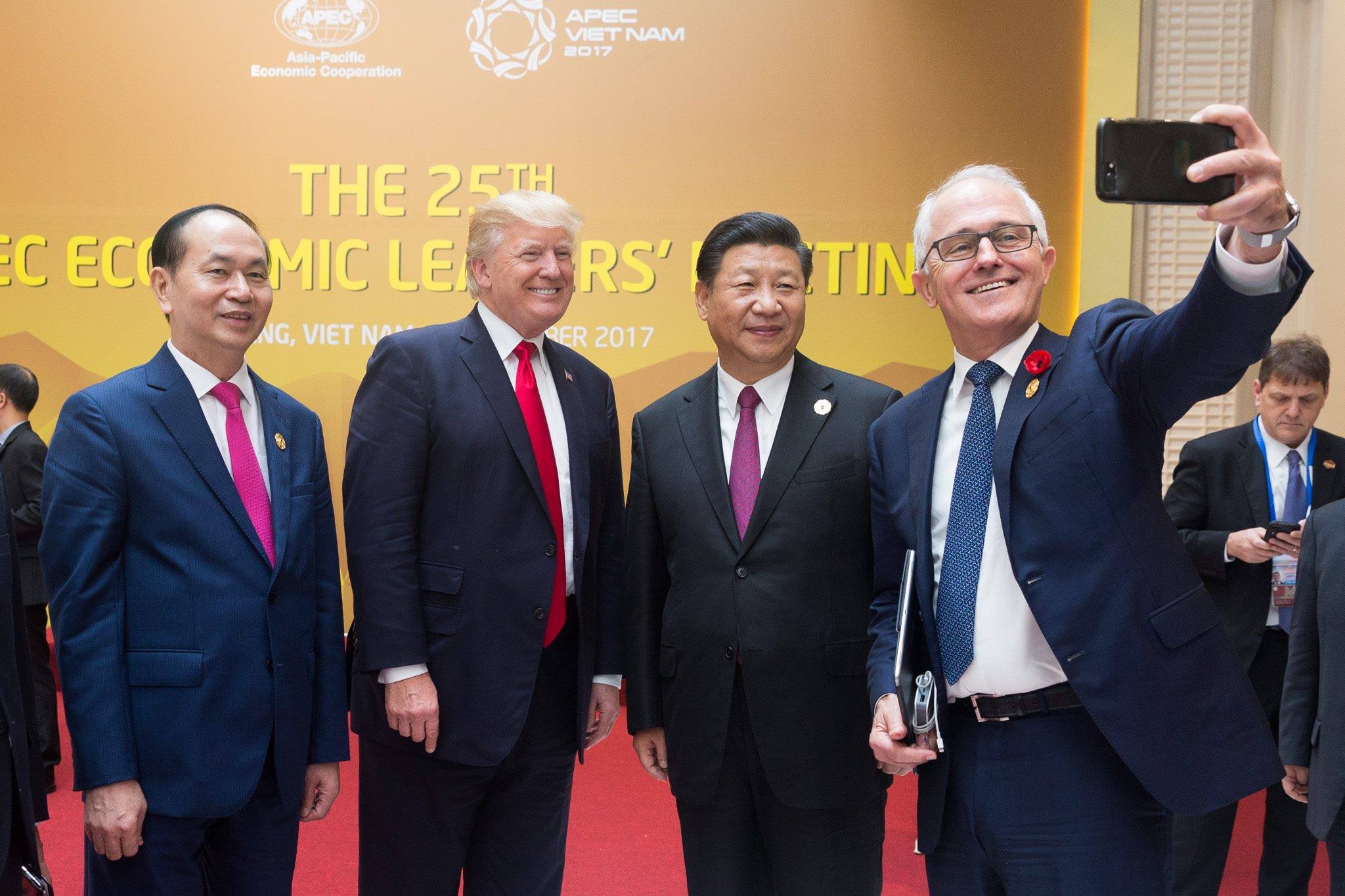
Prior to Turnbull becoming prime minister, the parliamentary Liberal Party had resolved to address the issue of same-sex marriage by putting the question to Australian voters via a plebiscite. However, enabling legislation for a plebiscite was rejected twice by the Senate. Consequently, the government decided to adopt a postal plebiscite option, which involved the Australian Bureau of Statistics conducting a nationwide survey asking voters whether they supported a change in the definition of marriage.
Ballots began being sent out on 12 September 2017, after attempts to prevent the survey through a High Court challenge failed. The survey concluded on 7 November 2017, with results released on 15 November. It returned a total of 7,817,247 (61.6%) "Yes" responses and 4,873,987 (38.4%) "No" responses. A leaked conversation in June 2017 revealed Turnbull loyalist Christopher Pyne telling a group of Liberal "moderates" that senior ministers, including George Brandis and Marise Payne, were on his side and would work to pass "marriage equality," always supporting Malcolm Turnbull's agenda. This was condemned by Tony Abbott as Pyne's "confession" to undermine him.
Following the postal survey's outcome, after four days of debates regarding amendments that included proposals to increase religious protections to refuse services to same-sex couples, same-sex marriage was legalized through a parliamentary vote by the House of Representatives on 7 December 2017. Turnbull himself voted "Yes." The first same-sex marriages in Australia occurred as a result of the law change from 9 January 2018.
8.3.4. Other key policies
The Turnbull government committed 95.00 M AUD to the Gold Coast Light Rail project. The government set a December 2016 deadline to select a single site for Australia's nuclear waste, with proposed locations including Sallys Flat in New South Wales; Hale in the Northern Territory; Cortlinye, Pinkawillinie, and Barndioota in South Australia; and Oman Ama in Queensland.
The Turnbull government moved to reform media ownership laws passed under the Keating government, a move that could allow for mergers between major TV networks and print media. The changes abolished rules preventing mergers between regional television networks and their metropolitan affiliates, and rules preventing a single owner from owning newspapers, radio stations, and television networks in the same major market.
Turnbull criticized Abbott's request for his ministers to boycott the Q&A program due to perceived "left-wing bias" and the Zaky Mallah incident. Turnbull stated during the boycott that "wherever there is an open microphone, I would be delighted to be on the other side." After becoming Prime Minister, Turnbull boycotted radio networks 2GB and 4BC following criticism from high-rating conservative commentators like Alan Jones, Andrew Bolt, Ben Fordham, and Ray Hadley. His ascension to Liberal leadership was generally welcomed by ABC political commentators such as Kerry O'Brien, Barrie Cassidy, Fran Kelly, and Paul Bongiorno. In April 2016, Turnbull had conducted 17 interviews on ABC, none on 2GB. Fairfax political commentator Mark Kenny called Turnbull the Coalition's "best electoral asset."
8.3.5. Foreign policy
Turnbull's first overseas visit as Prime Minister was to New Zealand, where he met with Prime Minister John Key to discuss immigration policy. In November, he announced a tour of five countries to attend high-level meetings in Europe and Asia. His government ratified the China-Australia Free Trade Agreement in Parliament in October 2015, and Turnbull continued Abbott's policy of advocating for a free trade agreement with India. Turnbull also pursued strengthening trade relations with Indonesia and Germany, and supported the formation of the Trans-Pacific Partnership (TPP). During his global tour in November 2015, Turnbull met with Indonesian President Joko Widodo and German Chancellor Angela Merkel to discuss trade. His government subsequently signed the TPP in February 2016.
Turnbull's stance on China was seen as pragmatic. He described China as Australia's "longest ally in the fight against Japan" during World War II, and was considered pro-China, prioritizing the largest trading partner. However, he also maintained the Quad framework (Japan, US, Australia, India) and opposed Chinese acquisitions of Australian assets when they threatened national interests, such as the 99-year lease of Port Darwin to a Chinese company, which drew criticism from the US due to its proximity to military bases.
As Environment Minister in February 2007, Turnbull welcomed the early conclusion of Japan's research whaling season due to a fire on the Nisshin Maru, stating that Australia would continue to advocate globally for the cessation of research whaling. After becoming Prime Minister, he chose Japan as his first East Asian destination, visiting on 18 December 2015. In talks with Prime Minister Shinzo Abe, Turnbull expressed deep disappointment regarding Japanese whaling, while also supporting Japan's Peace and Security Legislation and promoting joint exercises between the Japan Self-Defense Forces and the Australian Defence Force. They agreed to demand a halt to China's land reclamation in the South China Sea and expressed strong opposition to its activities in the East China Sea.
On 28 January 2017, Turnbull held a phone conversation with US President Donald Trump, urging him to honor the refugee resettlement agreement made with the Obama administration. This call was later described as "the worst call by far" by Trump, who tweeted on 2 February 2017 that the Obama deal was "dumb."
In 2016, Australia selected a French company for the construction of its next-generation submarines, initiating the Attack-class submarine program. However, in 2021, Australia cancelled the French contract in favor of acquiring US-made nuclear submarines, prioritizing its relationship with the United States. Turnbull strongly criticized this decision by the current government.
8.4. Parliamentary eligibility crisis
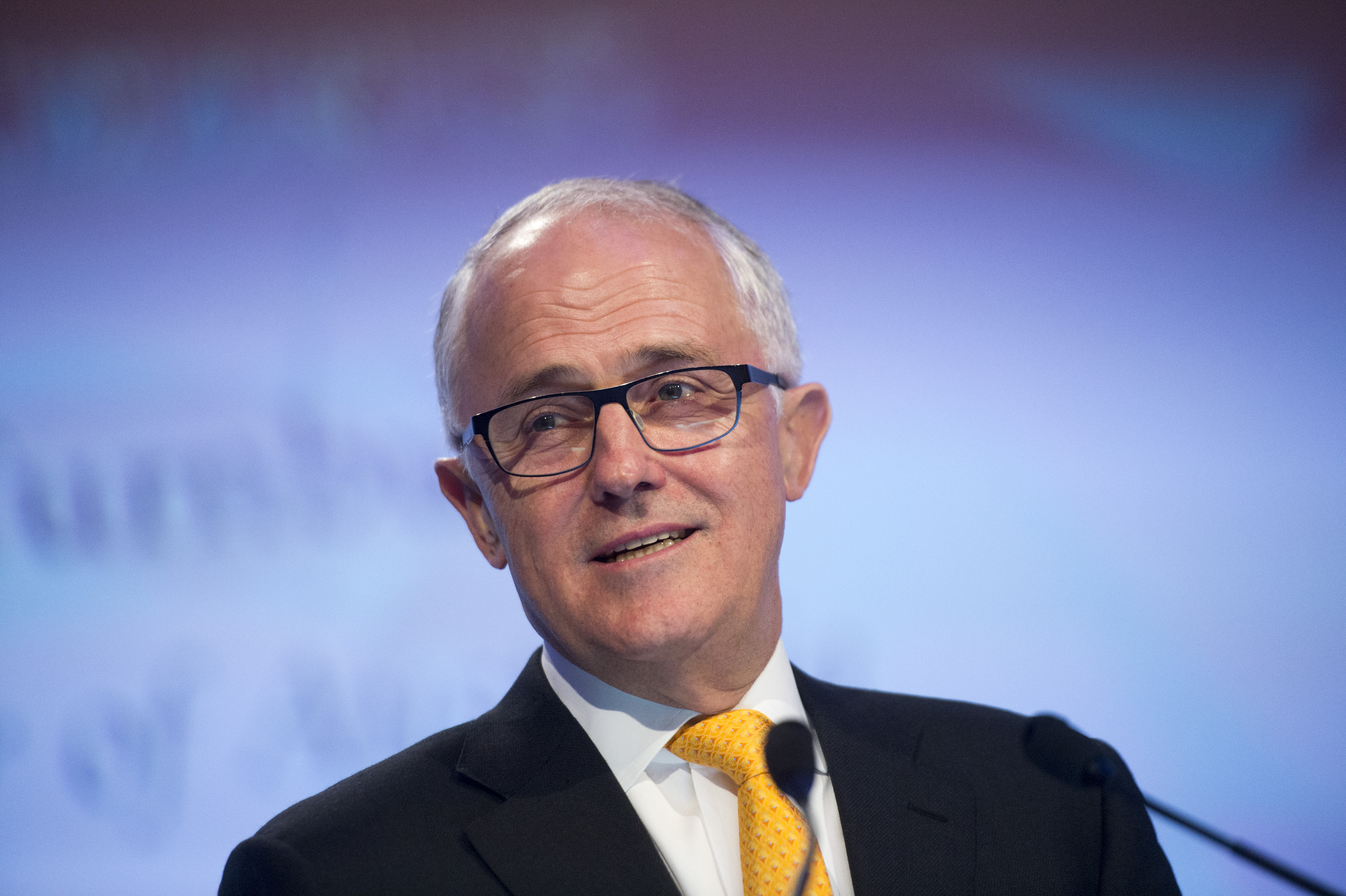
Members of Turnbull's government were among those affected by the 2017-18 Australian parliamentary eligibility crisis, which disqualified several parliamentarians found to hold dual citizenship in accordance with subsection 44(i) of the Australian Constitution. Three Cabinet members were among the "Citizenship Seven" whose cases were heard by the High Court of Australia: Deputy Prime Minister Barnaby Joyce, Senator Fiona Nash (leader and deputy leader of the co-governing National Party, respectively), and Resources Minister Matt Canavan, who had resigned from Cabinet upon discovering his potential dual citizenship. The High Court ruled that Canavan was eligible but disqualified dual citizens Joyce and Nash from Parliament.
The Turnbull government temporarily lost its one-seat majority in the House of Representatives following Joyce's disqualification and the resignation of Liberal Party MP John Alexander, who also held dual citizenship. However, in December 2017, both Joyce and Alexander, having renounced their foreign citizenships, successfully contested and won by-elections in their former seats of New England and Bennelong, respectively, thereby restoring Turnbull's governing majority in the House of Representatives.
8.5. August 2018 leadership spills
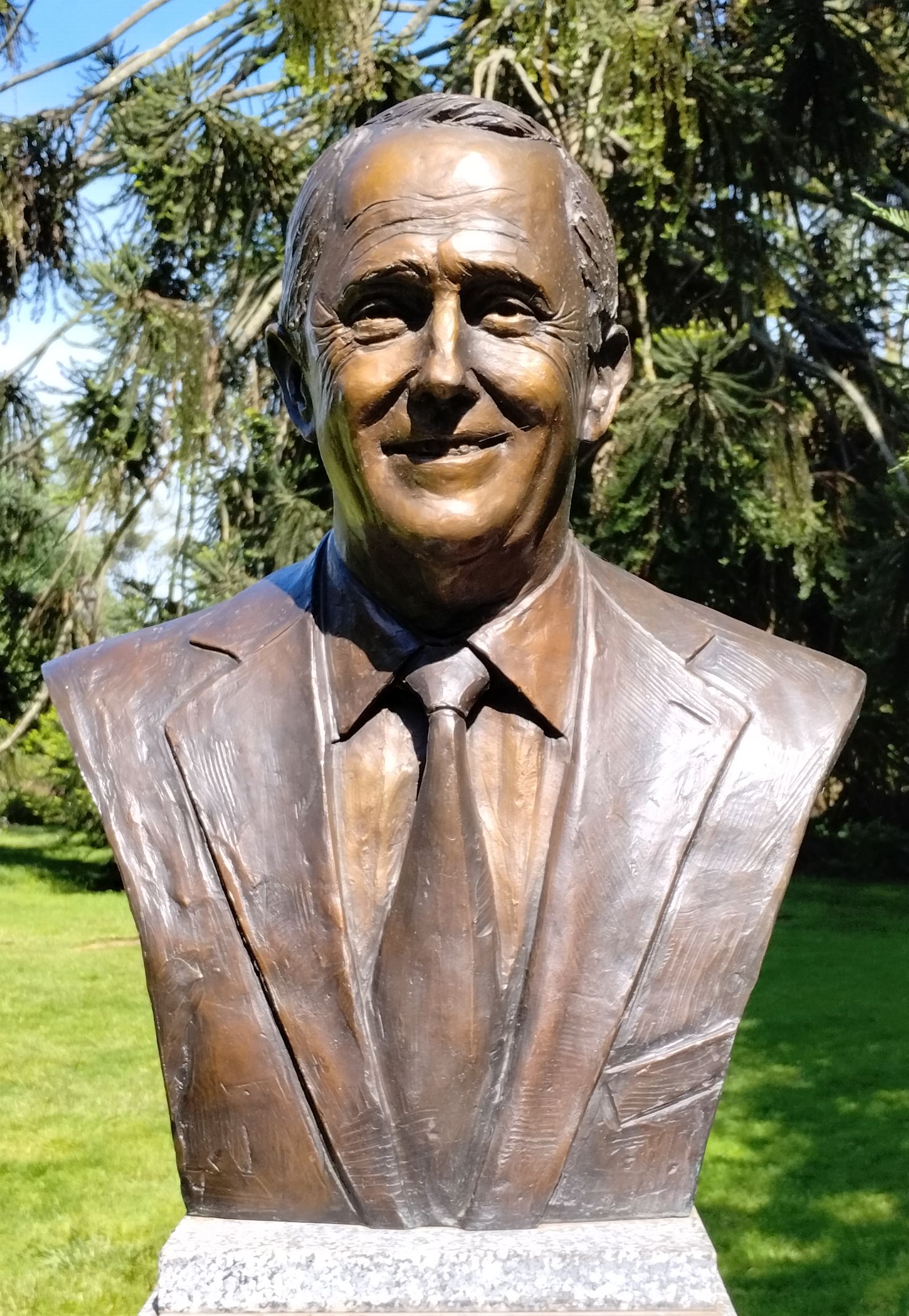
On 21 August 2018, Turnbull survived a challenge to his leadership of the Liberal Party by Home Affairs Minister Peter Dutton, winning by 48 votes to 35. The spill highlighted ideological tensions within the Liberal Party, between the moderate wing led by Turnbull and the conservative wing represented by Dutton and Tony Abbott. From 21 to 23 August, tensions escalated, and Dutton announced he would seek a second spill. Several key Turnbull supporters, including Michaelia Cash, Mitch Fifield, and Mathias Cormann, advised him that he no longer had sufficient support and resigned from their cabinet positions.
Turnbull responded that, pending a report from the Solicitor-General of Australia on Dutton's eligibility to serve in Parliament and the receipt of a petition bearing the signatures of at least half (43) of the parliamentary party, he would call such a meeting, vacate the leadership (regarding the petition as a vote of no confidence), and not stand in the subsequent leadership election. On the morning of 24 August, the Solicitor-General advised that Peter Dutton was "not ineligible" to serve, though there was a risk of the High Court finding a conflict of interest. Later that morning, Dutton presented Turnbull with a document containing the minimum 43 signatures.
A party meeting was then called, and the leadership was spilled. Scott Morrison was elected as Turnbull's successor by 45 votes over Dutton, who received 40 votes. In his final press conference as prime minister, Turnbull denounced Dutton and Abbott as "wreckers." On 27 August, Turnbull announced his intention to resign from Parliament in the coming days. He formally tendered his notice of resignation to the Speaker of the Australian House of Representatives on 31 August 2018. The Liberal Party subsequently lost the by-election in his former seat of Wentworth to independent candidate Kerryn Phelps, which resulted in the Coalition losing its absolute majority in the House of Representatives.
9. Political ideology
Malcolm Turnbull emerged from the moderate faction of the Liberal Party of Australia. He has been consistently characterized as pragmatic and holding a centrist ideology, with progressive and socially liberal views. He is considered an acolyte of former Prime Ministers Alfred Deakin and Robert Menzies.
In a 2017 speech, Turnbull articulated his political philosophy: "In 1944 Menzies went to great pains not to call his new political party, consolidating the centre right of Australian politics, 'conservative' - but rather the Liberal Party, which he firmly anchored in the centre of Australian politics." He further added, "The sensible centre, to use my predecessor Tony Abbott's phrase, was the place to be and it remains the place to be now." This indicates his belief in the Liberal Party's historical positioning as a broad-based, centrist force in Australian politics.
10. Life after politics
After his resignation from Parliament, Turnbull returned to the private sector. On 1 June 2019, he became a senior advisor to the major global private equity firm KKR. He returned to Australia in December 2019 and appeared on the final episode of Q&A hosted by Tony Jones on 9 December 2019.
Turnbull has publicly criticized the Morrison government for not taking sufficiently strong action on climate change, advocating for the readoption of his National Energy Guarantee (NEG) policy. In a piece for The Guardian, he wrote, "Scott Morrison can't afford to waste the bushfire crisis when Australia urgently needs its own Green New Deal... There are simply no more excuses. We cannot allow political prejudice and vested interests to hold us up any longer. If ever there was a crisis not to waste, it is this one. Morrison has the chance now to reinstate the NEG with higher targets. Both he and Josh Frydenberg were among its strongest supporters when I was PM. They abandoned it in the lead-up to an election, to pacify the right wing of the Coalition that sabotaged it in the first place."
On 25 October 2020, Turnbull publicly supported former Australian Prime Minister Kevin Rudd's petition for a "Royal Commission to ensure a strong, diverse Australian news media." This petition aimed to investigate Rupert Murdoch's control over Australian news media. Turnbull tweeted that he had signed it and encouraged others to do so. The petition became the most signed parliamentary e-petition in Australia, garnering over 500,000 signatures. It was tabled in the House of Representatives by Labor MP Andrew Leigh on 9 November 2020.
In January 2021, Turnbull joined the board of the International Hydropower Association as a non-executive member and became a co-chair of the organization's International Forum on Pumped Storage Hydropower.
In 2023, Turnbull delivered a speech at the Centre for Asia Pacific Resilience and Innovation's annual forum in Taipei, Taiwan. In his address, he asserted that Taiwan faced a greater threat from local actors spreading misinformation than from external forces, seemingly alluding to recent issues involving China.
11. Personal life
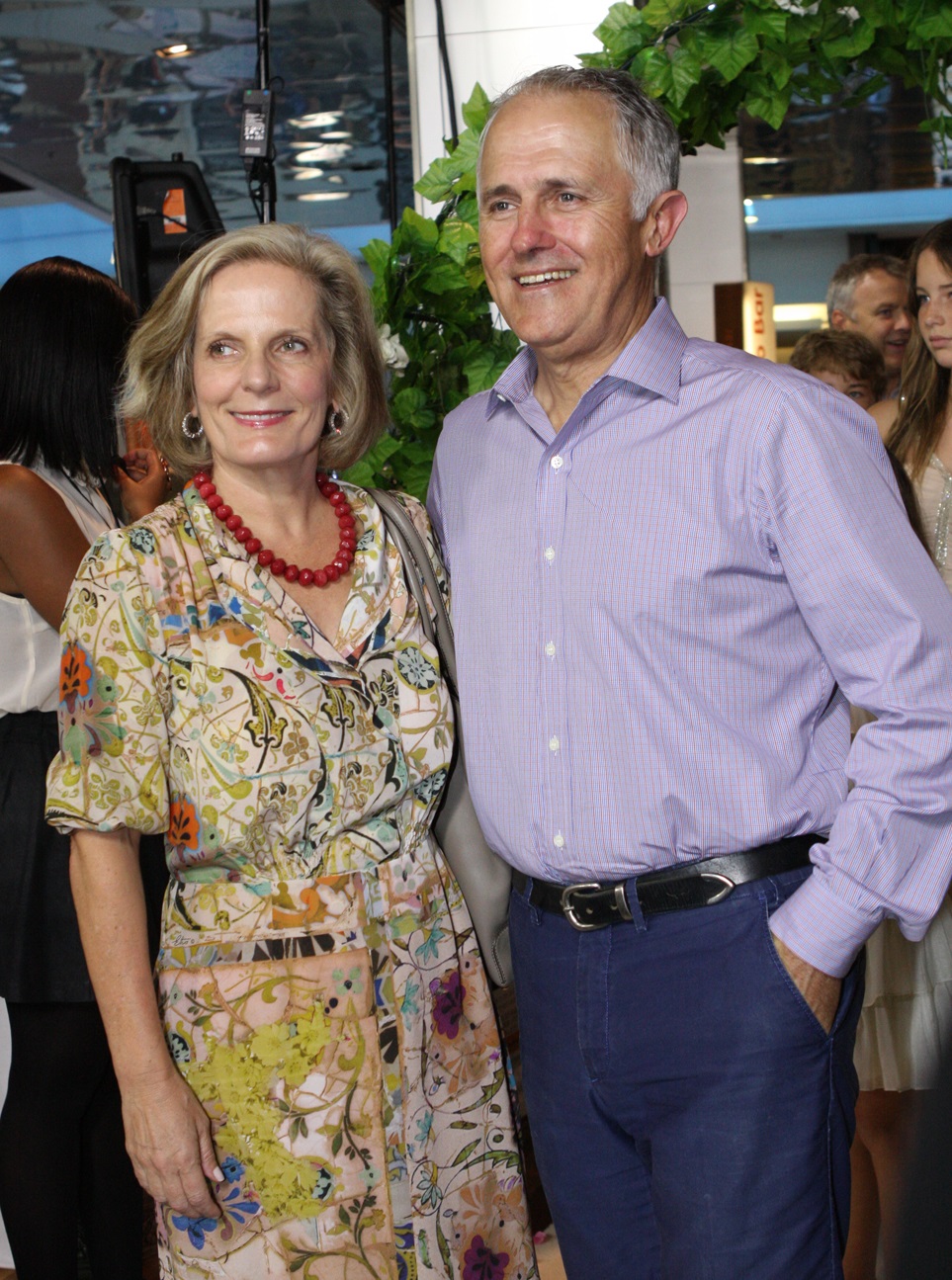
Turnbull is married to Lucy Turnbull (née Hughes), who served as the Lord Mayor of Sydney from 2003 to 2004 and has held several other prominent positions. The couple married on 22 March 1980 in Cumnor, Oxfordshire, officiated by a Church of England priest while Turnbull was studying at the University of Oxford. They reside in the eastern suburbs of Sydney.
Turnbull and Lucy have two adult children, Alex and Daisy, and as of July 2016, three grandchildren. Their son, Alex Turnbull, is married to Yvonne Wang, who is of Chinese descent. The use of "Bligh" as a male middle name is a long-standing tradition in the Turnbull family, also carried by his son. One of Turnbull's ancestors, colonist John Turnbull, named his youngest son William Bligh Turnbull in honor of the deposed Governor William Bligh during the Rum Rebellion.
In 2008, Turnbull became the first Liberal leader to have admitted to smoking cannabis.
11.1. Religion
Raised Presbyterian, Turnbull became agnostic in early adulthood before converting to Roman Catholicism by mid-2002. His wife's family is Roman Catholic. However, Turnbull has often found himself at odds with the Church's teaching on abortion, stem cell research, and same-sex marriage. He supported legislation relaxing restrictions on the abortion pill RU486 and also voted for the legalization of somatic cell nuclear transfer. He did so despite vocal opposition to both proposals from Cardinal George Pell, who was then the Archbishop of Sydney.
11.2. Personal wealth
In 2005, the combined net worth of Malcolm and Lucy Turnbull was estimated at 133.00 M AUD, making him Australia's richest parliamentarian until the election of billionaire Clive Palmer in the 2013 election.
Turnbull was included in the BRW Rich 200 list for the second consecutive year in 2010. Although he slipped from 182nd to 197th place, his estimated net worth increased to 186.00 M AUD, and he remained the only sitting politician on the list. He was not listed in the 2014 BRW Rich 200. As of 2015, his estimated net worth exceeded 200.00 M AUD.
12. Honours
On 1 January 2001, Turnbull was awarded the Centenary Medal for his services to the corporate sector. In the 2021 Australia Day Honours, he was appointed a Companion of the Order of Australia (AC) for "eminent service to the people and Parliament of Australia, particularly as Prime Minister, through significant contributions to national security, free trade, the environment and clean energy, innovation, economic reform and marriage equality, and to business and philanthropy."
13. Published works
Turnbull has authored several books, primarily focusing on the republican debate and his experiences during the Spycatcher trial:
- The Spycatcher Trial (1988)
- The Reluctant Republic (1993)
- Fighting for the Republic: The Ultimate Insider's Account (1999)
- A Bigger Picture (2020)
14. Electoral history
| Election | Office | Term | Party | Primary Vote % | Primary Votes | Two-Party Preferred % | Two-Party Preferred Votes | Result | Outcome |
|---|---|---|---|---|---|---|---|---|---|
| 2004 | Member for Wentworth | 41st Parliament | Liberal | 41.79% | 30,771 | 55.48% | 40,847 | 1st | Elected |
| 2007 | Member for Wentworth | 42nd Parliament | Liberal | 50.37% | 44,463 | 1st | Elected | ||
| 2010 | Member for Wentworth | 43rd Parliament | Liberal | 59.57% | 51,634 | 1st | Elected | ||
| 2013 | Member for Wentworth | 44th Parliament | Liberal | 63.32% | 58,306 | 1st | Elected | ||
| 2016 | Member for Wentworth | 45th Parliament | Liberal | 62.26% | 52,353 | 1st | Elected |